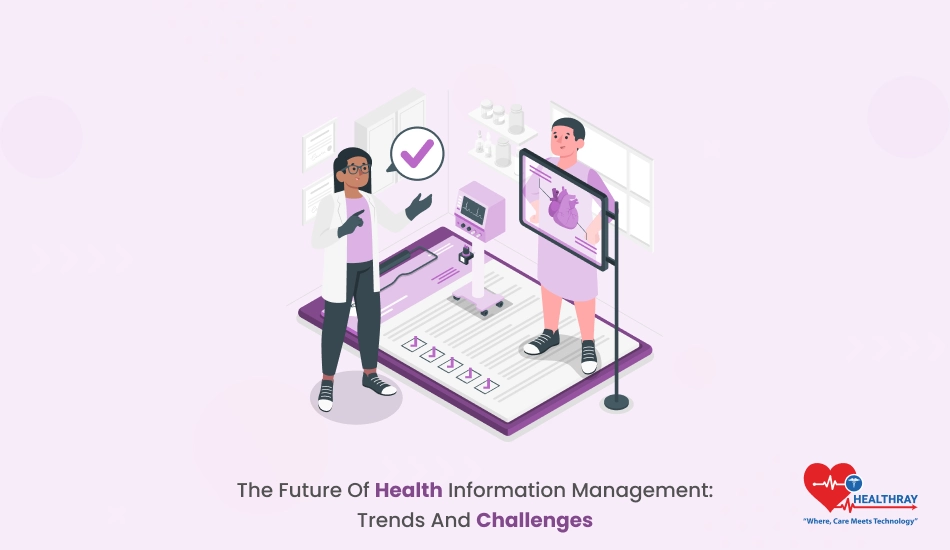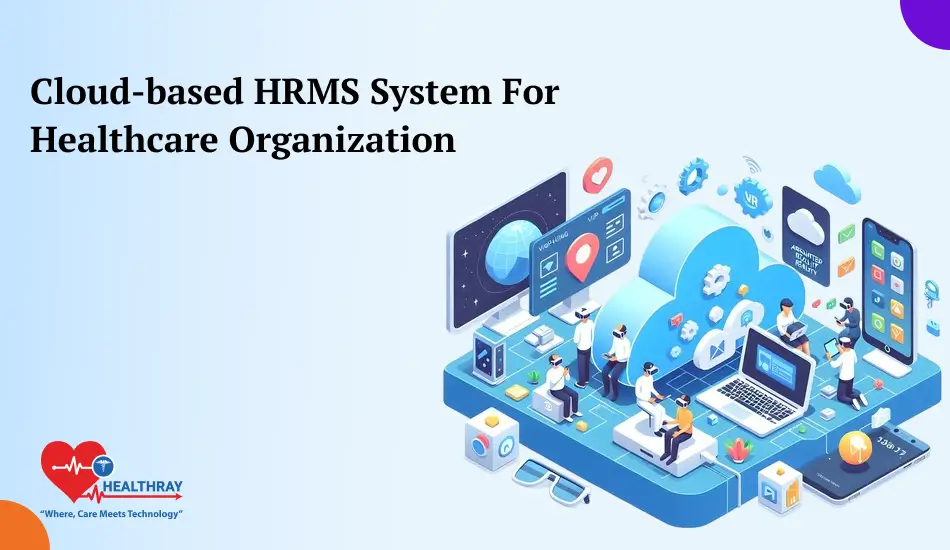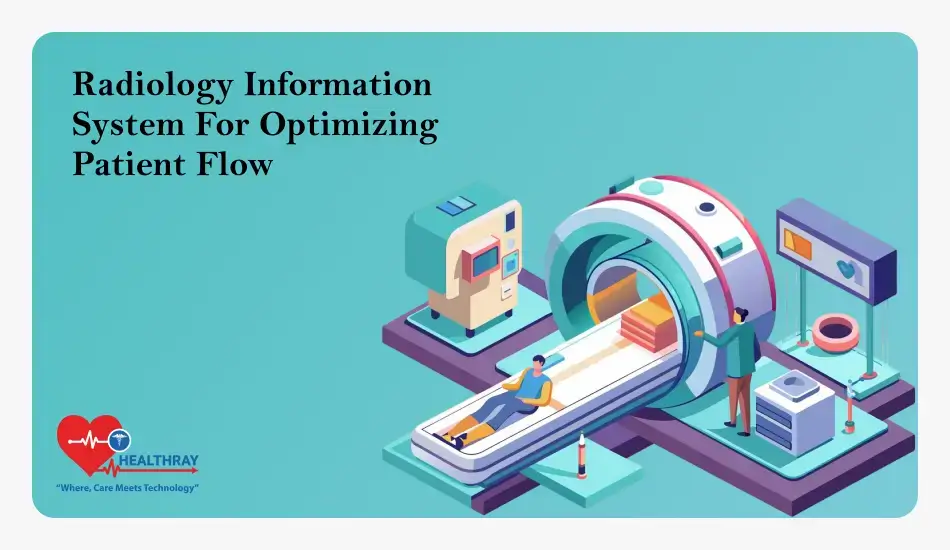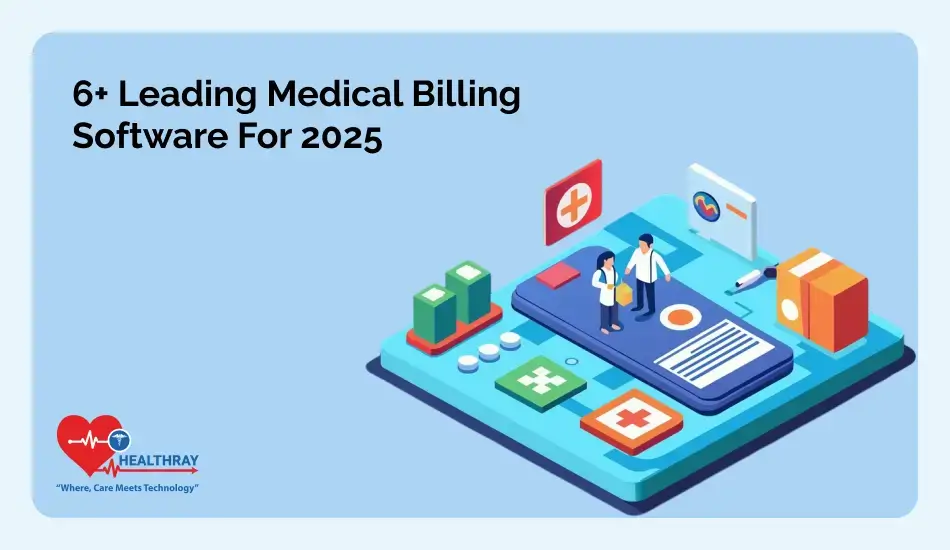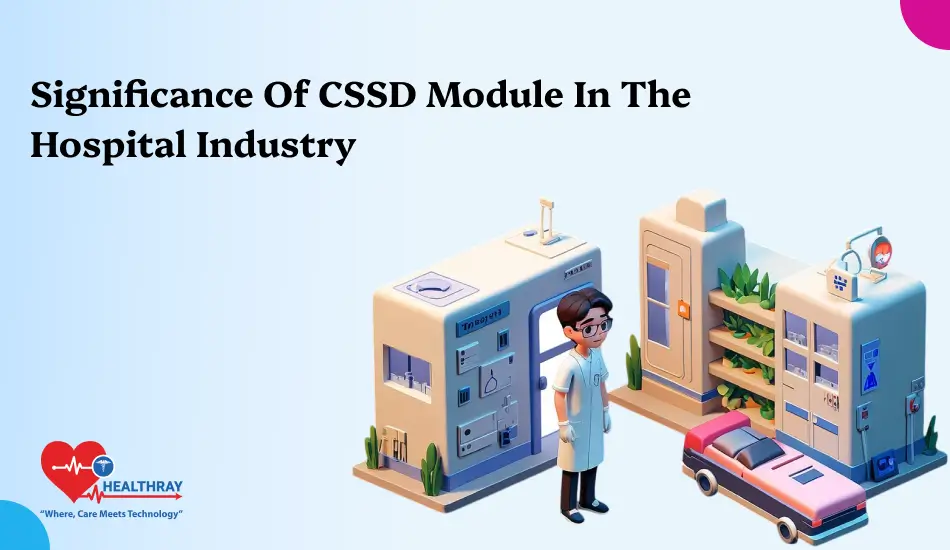Quick Summary
In the era of boosting the healthcare sector, there is a high demand for modern and advanced technologies that improve the lifestyle of citizens. Moreover, the health information management system addresses many challenges such as data integrity, difficulty in integrating with other medical practitioners, and more. There are modern healthcare key trends that aid in facing future healthcare challenges.
Introduction
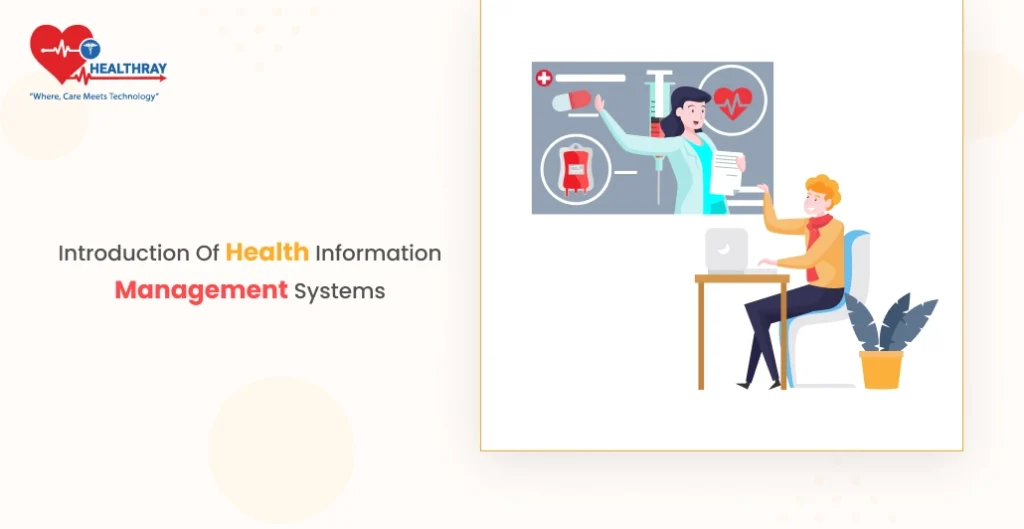
In the modern midst, where modern technologies are introduced day by day to increase the citizen’s lifestyle. The major component for enhancing life standards is to maintain a healthier life. A healthy life requires lots of effort from maintaining a health care routine to preparing medical finances.
Having an optimistic mind is crucial for a speedy recovery, but it is only possible with healthcare modernization tools like Healthray, the best Hospital Information Management System for addressing healthcare challenges. This platform introduces vital trends that help overcome hospital obstacles to accomplish healthcare objectives.
Revolutionary system for healthcare organization due to applying AI algorithms in CRM system, appointment handling system, sales management system, stock optimization, and cost management system. Provide top-to-bottom clinical service to ease work, augments healthcare performance and increases better decisions.
With the renowned HMS software, you craft healthcare documents with no hassle and enhance security while you transcribe or communicate with patients. Furthermore, manage the healthcare system with the automated tools from scheduling management to ward management. Retains the resources information of the healthcare organization, distributing among healthcare systems effortlessly.
Furthermore, the hospital management system enhances data transparency, facilitates scalability, augments reliability, avoids wastages, and decreases costs. In this modern time, patients seek modern healthcare facilities that help them to recover their health fast.
This tremendous shift in the medical industry brings a transformative change in patient’s lives. Hospital management system will improve patient care and ensure compliance with health policy. Supports in taking security measures for protecting patient sensitive information.
Explore Vital Trends For Reshaping Healthcare Technology
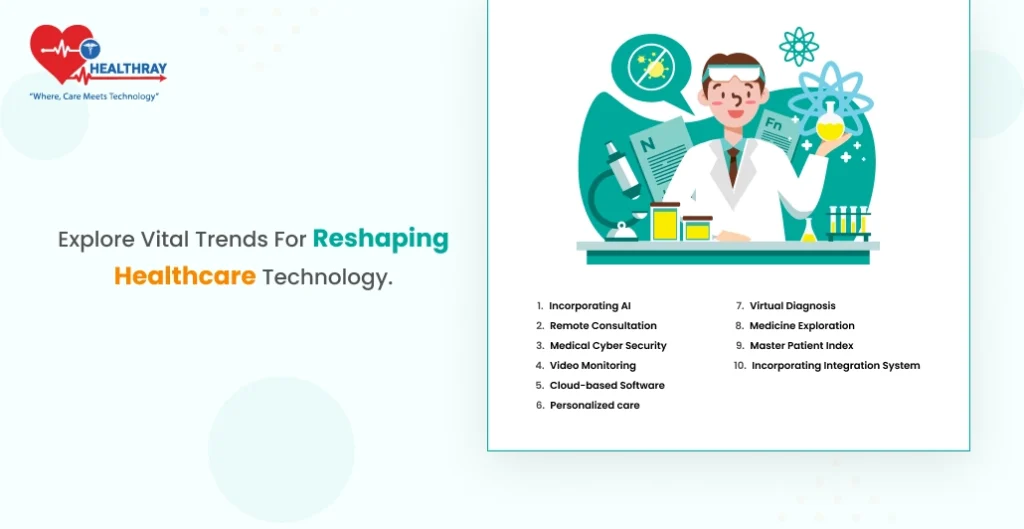
There are innumerable healthcare challenges including difficulty in accessing medical care in remote or rural areas, continuously increasing healthcare costs, and difficulty in finding medical staff who have proper healthcare knowledge. To handle this situation, introducing trends through the health management information system. Here are a few vital emerging trends including :
- Incorporating AI
- Remote Consultation
- Medical Cyber Security
- Video Monitoring
- Cloud-based Software
- Personalized care
- Virtual Diagnosis
- Medicine Exploration
- Master Patient Index
- Incorporating Integration System
Incorporating AI
Artificial intelligence has persistently increased nowadays and many people already have taken advantage of AI-enabled technologies. How do we leave healthcare technology which is the base for future modernization? Take a look below to explore artificial intelligence advantages in the healthcare industry :
- Centralizing medical and patient data from various sources.
- Developed customization prescription template which can be modified as per the needs of medical specialists.
- Compliance with healthcare regulations from authorized medical authorities.
- Streamlining healthcare operations from automated systems.
- Health information management system aids in reducing patient and hospital costs.
- Maintaining entire electronic medical documents from consent documents to discharge documents.
- No need to store inventory information and computing the stocks manually, it is predicted through analyzing the old patterns.
- Ease to store and scrutinize radiology images, supporting patient treatment and enhancing outcomes.
- Centralized healthcare records and accessible from any place with the help of a cloud-based system.
- Get triggers at the time of skipping regulations, remind you about appointments, and when radiology reports are ready.
Remote Consultation
- Remote consultation is the only medium where you connect with any medical provider and specialists from any location.
- By using Healthray’s health information management system, patients communicate with experts at their convenience and also, they receive opportunities to enhance their medical experience and knowledge.
- Medical specialists benefit from coordinating with different types of medical specialists such as cardiologists, dermatologists, pulmonologists, dermatologists, etc.
- Patients can communicate with healthcare professionals via video conferencing, messaging, and calls. This platform runs on any digital device whether it is i-pad, laptop, computer system, or any mobile device.
- This is more advantageous for rural and remote citizens and disabled persons who have some physical issues and trouble in movement from one place to another place.
- Health management information system increases the hospital revenue and minimizes the expenses which are incurred on setting up an additional unit. Also, saves patients money incurred on traveling and medical tourism.
- No doubt, the HMS software contributes in saving travelling costs and their precious time for administering other significant health concerns.
- Clients get remote care with the negligible costs and it makes an outstanding platform for all patients.
Medical Cyber Security
- Cyber security is an essential component for medical data protection and maintaining the confidentiality of patient information.
- Most attacks are caused by medical errors, non-compliance with medical regulations, opening unnecessary links, and stealing medical information.
- To solve the problem of cyber attacks, always select the best health information management system like Healthray.
- This platform ensures adherence to healthcare regulations formulated by the World Health Organization (WHO) and National Health Authority (NHA).
- Data security can be achieved by following procedures such as data encryption, strong passwords, and controlling accessible information.
- Facilitating two-factor authentication plays a crucial role in protecting healthcare data and is considered a strict measure. Thus, it restricts unauthorized access.
Video Monitoring
- It is a modern era of monitoring that provides real-time patient information for spotting weak health areas that require proper medication and maintains persistent records of progression reports.
- Health information management systems are more useful for staff managers who need to oversee employee activities from any location. Thus, enhancing better healthcare services.
- This platform maintains staff documents and their working activities in digital format. Therefore, it ensures data management effectively with adherence to healthcare regulations.
- Persistent monitoring aids in maintaining medicinal stock levels, reducing the risk of dangerous diseases that can adversely affect health. Also, improving patient’s health quickly.
- Enhancement of various security in the healthcare industry such as data security, medical equipment security, and patient security. Thus, increasing patient satisfaction.
- The HMS software improves healthcare quality services which in turn leads to increased patient participation and reduces their attrition rate.
Cloud-based Software
- This collects all data in a single server rather than requiring the installation of individual servers.
- It has vast benefits such as increased data security by restricting unauthorized access, minimized cost of installation, and aids in sharing healthcare documents with other healthcare specialists.
- Cloud-based software is a crucial consideration while choosing software for your hospitals like Healthray, the best health information management system.
- HMIS Software can help in facing healthcare challenges such as access authorization, data security issues, and hard to collaborate with medical providers. Thus, improve patient care.
- Maintaining centralized health data is a troubleshooting process that is easier with Healthray’s health information systems.
- Allows medical professionals to access medical data from any remote location. Easy to persistently update records and aid in expanding software as growth of the hospital.
Personalized care
- Health management information systems centralize patient data and systematically organize them. Also, automatically generates medical reports.
- Patients can oversee their health monitoring and progression reports, leading in wise healthcare day-to-day decision-making.
- Health information management changes the scenario from doctor-centric information to accessible patient information.
- After HMS implementation, the hospitals or clinics have been focused on critical areas like patient care and hospital revenue.
- Customized templates have the great potency to store conveniently, create multiple templates at a specified time, and share at any location.
- Video monitoring strengthens the connection between physician and patient and a best source of yielding side income.
Virtual Diagnosis
- Virtual diagnosis refers to treating patients from home or any location. It is best for those people who have scarce healthcare facilities in their area.
- Patients can receive medical advice from any location and mainly, it is a benefit for villagers and minimizes traveling and accommodation expenses.
- Eliminate queue management systems and in-person communication with medical practitioners through Healthray’s health management information systems.
Step towards digital era with our healthcare solution
Revamp your hospital facilities and embrace change for better healthcare management. Ease in managing and organizing large medical datasets leads to effective analysis. Seize the opportunity now!
Medicine Exploration
The development of medicine is a complicated procedure that requires intense medical research and patient monitoring continually.
With Healthray’s health management information system, it is easy to discover the medicine requirement that minimizes the risk to a patient’s health.
Master Patient Index
- It contains accumulated patient data which includes diagnostic information, test results, previous medical documents, prescription details, and progression notes.
- These medical records are recorded in a structured format and also provide medical reports in a graphical format which is easy to understand. Therefore, it helps inform decision-making.
Incorporating Integration System
Health information systems allow healthcare providers to share medical documents with other specialists for medical advice and can consult from their homes. Consequently, enhances the chances of earning revenue.
Health management information systems integration with different disparate systems, facile sharing of medical documents with maintaining strict security protocols. Thus, the hospital management system (HMS) increases patient care and increases medical experience.s patient care and increases medical experience.
Role of Health Management Information Systems for Improving Healthcare Facility
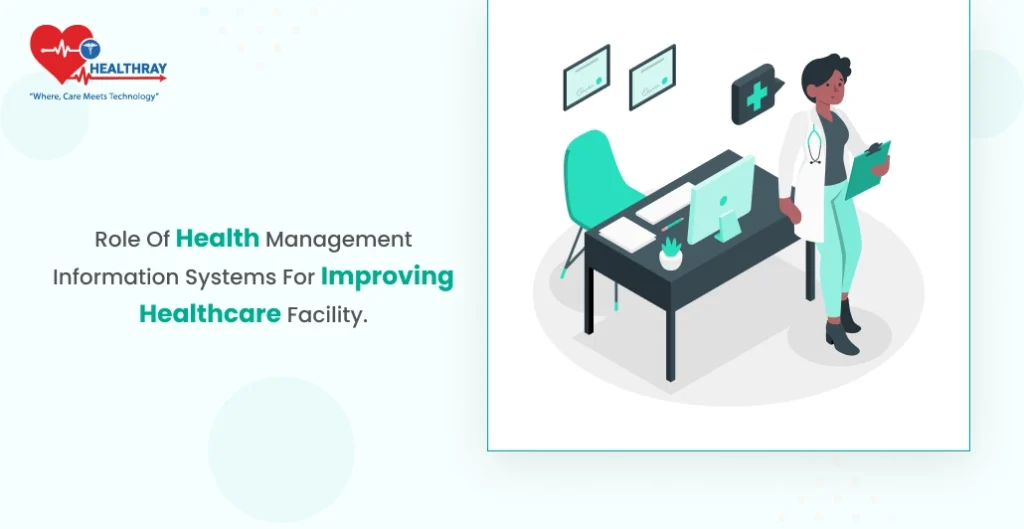
Implementation of a Health Information Management System has a profound impact on hospital infrastructure and healthcare facilities. In the health sector, data has vast importance for improving patient quality care, let’s look below at the key role of health information systems :
- Customized prescription templates
- Minimize Healthcare Risks
- Healthcare Resources management
- Enhanced Patient Safety
Customized prescription templates
A health management information system facilitates digital prescription templates that can be customized as per the requirements of different medical specialists. Glimpse of prescription template benefits :
- Speed the work of healthcare professionals.
- Maintaining standardized templates.
- Adherence to medical regulations.
- Reduced manual errors in prescription details.
- Simplifies medical treatments.
- Drafting the template based on healthcare tasks.
- Mitigating the physician efforts while crafting prescriptions.
Minimize Healthcare Risks
- This is a critical objective of every healthcare sector to improve patient care and their safety. Securely store healthcare data and effectively manage them.
- Ensures following government medical regulations and aids in visualizing business intelligence reports. Thereby, assisting in formulating cost-effective healthcare strategies.
- This tool supports data-driven decision-making. Therefore, it minimizes the risk of chronic diseases.
Healthcare Resources Management
Managing resources is an essential task as it aids in managing various types of resources such as human resources, financial resources, physical resources, and medical research resources.
Health information systems minimize staff workload by automating hospital tasks. Therefore, reduces healthcare costs such as recruitment, paper, and postage expenses. Additionally, maintaining optimum utilization of medical resources.
Enhanced Patient Safety
Hospital Information Management software adhere to medical regulations that are formulated by authorized government authorities namely, the Medical Council of India.
Continuous monitoring of staff performance remotely can minimize redundancy through tracking staff performance and managers can easily identify where to allocate hospital redundancy identify where to allocate hospital resources.
The health information management system maintains document confidentiality with the authoritative guidelines such as European commission, HIPAA compliance, and GDPR. Additionally, implementing modern methodologies like data encryption, clear workflows, and two-factor authentication.
Therefore, it increases patient faith, support for restraining customer attrition rate, and increases healthcare revenue.
Adopting Electronic Health Records for Future Healthcare Industry
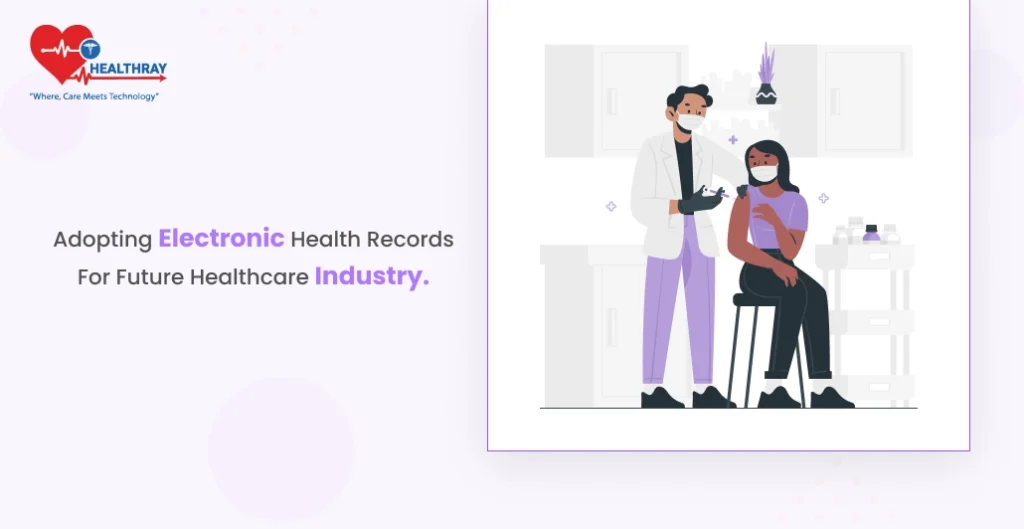
Embracing the concept of electronic health records will have a revolutionary impact on the future healthcare industry. This concept will address many medical challenges such as troublesome to maintain medical documents, hard to maintain slips of medical bills, more time incurred in administrative tasks, and difficulty in taking timely follow-up.
Electronic health record maintains patient medical information in the ledger and tabular format. Therefore, it is easy to fetch information whenever required. This information includes medical documents, lab results, radiology images, allergies, and vital signs.
Incorporates various functionalities including healthcare accessibility, coordinates with different medical departments, and enables digital prescription. Consequently, health management information systems reduce manual errors, maintain up-to-date medical information, and enhance coordination among medical experts.
Conclusion
Health Information Management System is the foundation for the healthcare industry. The future of health information management has changed due to emerging trends including incorporating AI, remote Consultation, medical cyber security, and more. Additionally, these trends effectively address medical challenges. Embracing electronic health records is crucial to cope with the modern trends.
